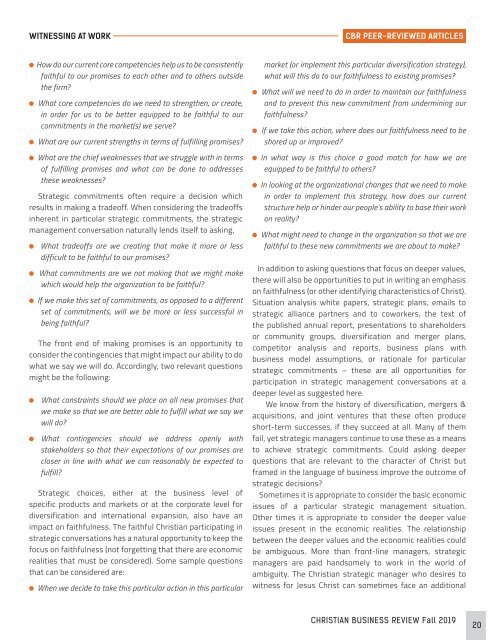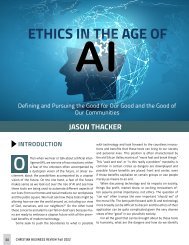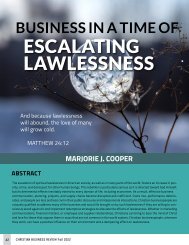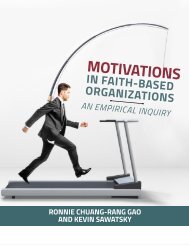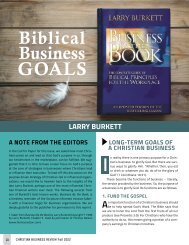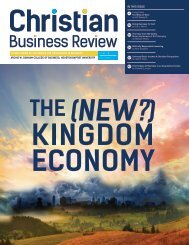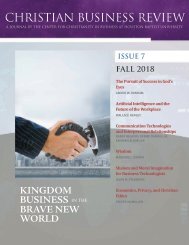Christian Business Review 2019: Workplace Practices That Glorify God (Issue 8)
Create successful ePaper yourself
Turn your PDF publications into a flip-book with our unique Google optimized e-Paper software.
WITNESSING AT WORK<br />
CBR PEER-REVIEWED ARTICLES<br />
How do our current core competencies help us to be consistently<br />
faithful to our promises to each other and to others outside<br />
the firm?<br />
What core competencies do we need to strengthen, or create,<br />
in order for us to be better equipped to be faithful to our<br />
commitments in the market(s) we serve?<br />
What are our current strengths in terms of fulfilling promises?<br />
What are the chief weaknesses that we struggle with in terms<br />
of fulfilling promises and what can be done to addresses<br />
these weaknesses?<br />
Strategic commitments often require a decision which<br />
results in making a tradeoff. When considering the tradeoffs<br />
inherent in particular strategic commitments, the strategic<br />
management conversation naturally lends itself to asking,<br />
What tradeoffs are we creating that make it more or less<br />
difficult to be faithful to our promises?<br />
What commitments are we not making that we might make<br />
which would help the organization to be faithful?<br />
If we make this set of commitments, as opposed to a different<br />
set of commitments, will we be more or less successful in<br />
being faithful?<br />
The front end of making promises is an opportunity to<br />
consider the contingencies that might impact our ability to do<br />
what we say we will do. Accordingly, two relevant questions<br />
might be the following:<br />
What constraints should we place on all new promises that<br />
we make so that we are better able to fulfill what we say we<br />
will do?<br />
What contingencies should we address openly with<br />
stakeholders so that their expectations of our promises are<br />
closer in line with what we can reasonably be expected to<br />
fulfill?<br />
Strategic choices, either at the business level of<br />
specific products and markets or at the corporate level for<br />
diversification and international expansion, also have an<br />
impact on faithfulness. The faithful <strong>Christian</strong> participating in<br />
strategic conversations has a natural opportunity to keep the<br />
focus on faithfulness (not forgetting that there are economic<br />
realities that must be considered). Some sample questions<br />
that can be considered are:<br />
When we decide to take this particular action in this particular<br />
market (or implement this particular diversification strategy),<br />
what will this do to our faithfulness to existing promises?<br />
What will we need to do in order to maintain our faithfulness<br />
and to prevent this new commitment from undermining our<br />
faithfulness?<br />
If we take this action, where does our faithfulness need to be<br />
shored up or improved?<br />
In what way is this choice a good match for how we are<br />
equipped to be faithful to others?<br />
In looking at the organizational changes that we need to make<br />
in order to implement this strategy, how does our current<br />
structure help or hinder our people’s ability to base their work<br />
on reality?<br />
What might need to change in the organization so that we are<br />
faithful to these new commitments we are about to make?<br />
In addition to asking questions that focus on deeper values,<br />
there will also be opportunities to put in writing an emphasis<br />
on faithfulness (or other identifying characteristics of Christ).<br />
Situation analysis white papers, strategic plans, emails to<br />
strategic alliance partners and to coworkers, the text of<br />
the published annual report, presentations to shareholders<br />
or community groups, diversification and merger plans,<br />
competitor analysis and reports, business plans with<br />
business model assumptions, or rationale for particular<br />
strategic commitments – these are all opportunities for<br />
participation in strategic management conversations at a<br />
deeper level as suggested here.<br />
We know from the history of diversification, mergers &<br />
acquisitions, and joint ventures that these often produce<br />
short-term successes, if they succeed at all. Many of them<br />
fail, yet strategic managers continue to use these as a means<br />
to achieve strategic commitments. Could asking deeper<br />
questions that are relevant to the character of Christ but<br />
framed in the language of business improve the outcome of<br />
strategic decisions?<br />
Sometimes it is appropriate to consider the basic economic<br />
issues of a particular strategic management situation.<br />
Other times it is appropriate to consider the deeper value<br />
issues present in the economic realities. The relationship<br />
between the deeper values and the economic realities could<br />
be ambiguous. More than front-line managers, strategic<br />
managers are paid handsomely to work in the world of<br />
ambiguity. The <strong>Christian</strong> strategic manager who desires to<br />
witness for Jesus Christ can sometimes face an additional<br />
CHRISTIAN BUSINESS REVIEW Fall <strong>2019</strong><br />
20 2


